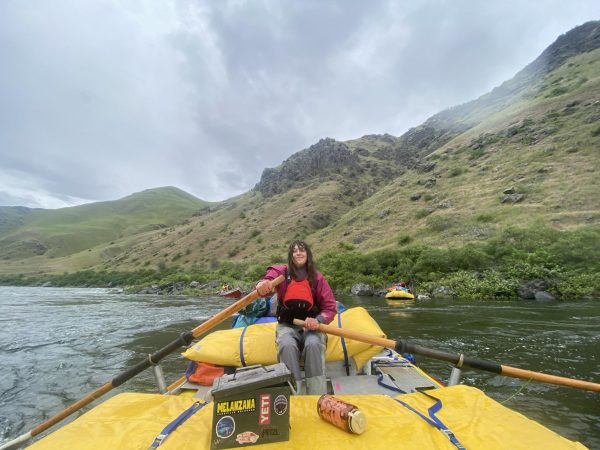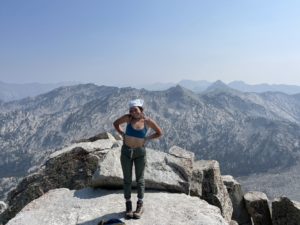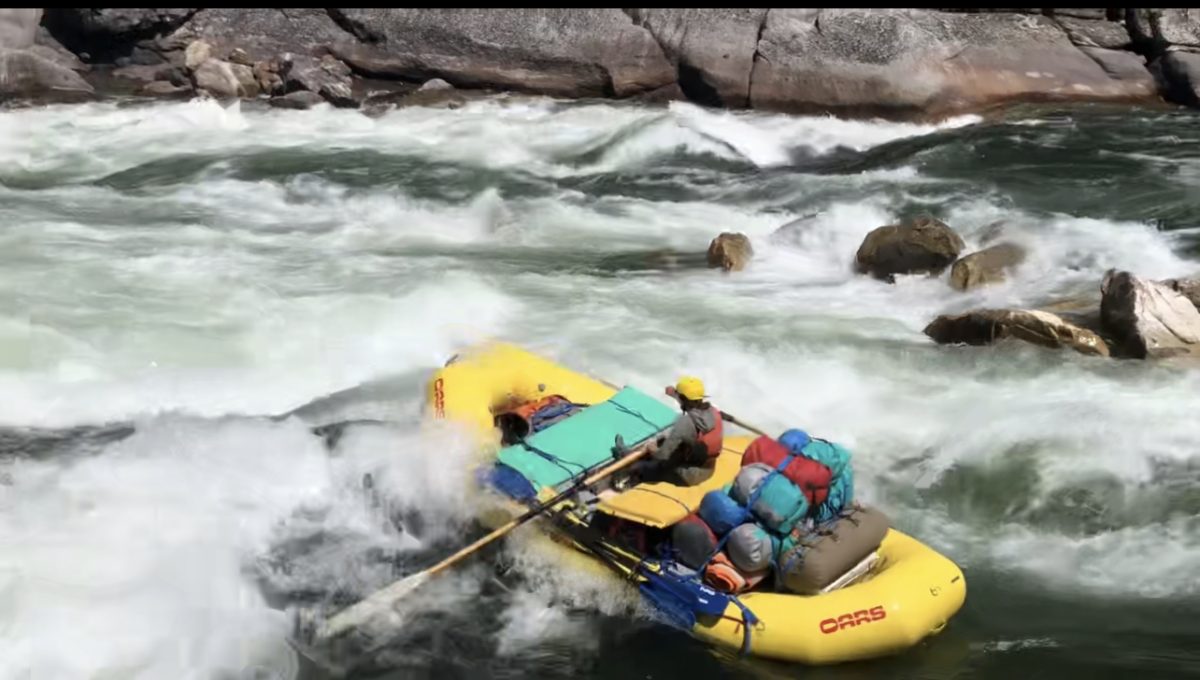In the Panhandle of Idaho
In the panhandle of Idaho where the world feels a little holier, I was a brand-new river guide. On my first commercial trip I ran the Main Salmon, a section of “wild and scenic” river protected under the The Wild and Scenic Rivers Act. The act prevents rivers from being dammed or destroyed, it preserves the integrity of waterways across the United States. The Salmon is one such river.
On this fateful trip the Salmon was flowing at approximately 68,800 CFS; extremely high – this section of the river typically flows at approximately 3,789 CFS. Catching eddies was impossible- eddies are recirculating water on riverbanks used to stop moving downstream. In the world of boating a ferry angle is the angle at which the boat moves most effectively across the river. In order to maintain this angle, you must pull vigorously at the oars upstream, downstream, then both in synchrony as the current tries to push the boat downstream away from the eddy.
In the panhandle of Idaho where the world feels holier, I did not know a thing about ferry angles. This became an excruciatingly clear fact. Day three on the Main is white water day. As guides, we anxiously anticipate day three. Day three means dressing up in white water attire. We dawn tutus and glittery pants, cheetah print and silly hats all in the name of ritual. Day three also means we run the rapids Five-Mile, Split Rock, Big Mallard, Elk Horn, and day three means Whiplash. At lower water levels, Whiplash is less of a rapid and more of a pleasant wave train leading to a recirculating eddy pushing you towards a rock wall. However, at 68,800 CFS, Whiplash is a frightening monster. The once splashy wave train becomes a giant progression of boat flipping waves, pushing you violently toward the rock wall in a manner that results in utter destruction if mis-navigated. It is considered one of, if not the hardest rapid at high water on the Main Salmon.
I was sharing a boat with another rookie guide, Joy. We successfully ran Five-Mile, greased Split Rock, plunged right through Big Mallard and avoided the trauma of Elk Horn rock. All that was left was Whiplash. Our trip leader warned us that we were going to eddy out above Whiplash to scout, we watched anxiously for the signal of the boater ahead, circulating his hand in the air. This is the indication that it’s time to pull like hell, and not to stop until the yellow rubber pleasantly laps the rocks on the shore.
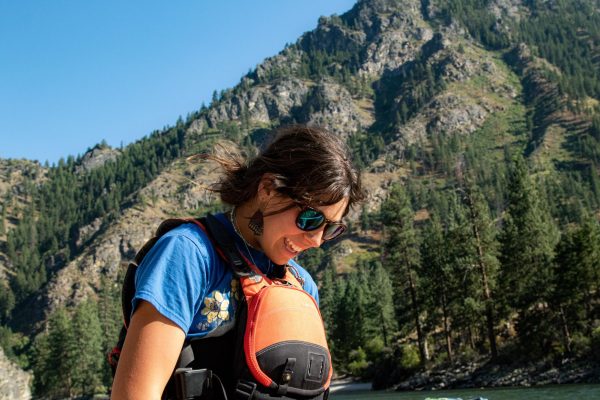 Approaching Whiplash, the signal was thrown. Joy and I stared intently ahead, watching as the boat in front of us entered a wave train adjacent to the eddy we needed to catch. The boater ahead of us pulled hard out of the waves. Their 18-foot raft looked pathetically small against the wall of water behind it. “Here goes nothing,” I thought as I watched Joy turn the boat sideways, hoping to replicate the ferry angle that we’d heard rumors of but truly didn’t understand, much less comprehended how to execute.
Approaching Whiplash, the signal was thrown. Joy and I stared intently ahead, watching as the boat in front of us entered a wave train adjacent to the eddy we needed to catch. The boater ahead of us pulled hard out of the waves. Their 18-foot raft looked pathetically small against the wall of water behind it. “Here goes nothing,” I thought as I watched Joy turn the boat sideways, hoping to replicate the ferry angle that we’d heard rumors of but truly didn’t understand, much less comprehended how to execute.
In the panhandle of Idaho where the world feels holier, our little boat rocked and surged through the entrance of the waves. From the right, suddenly, a massive 10-foot wave crashed on the side of our skiff. Practically sideways, our raft loomed above our eyes, as if it was screaming, “High-side, you idiots!” I threw my body hard against the left side of the boat, hoping the weight of my flesh and bones would be hearty enough to return our little yellow home to equilibrium. Success! The boat sank back into the trough of the wave, but in the chaos of the near flip, our left oar had departed on an adventure of its own. Joy glanced at me in horror, as she pulled with every ounce of her strength on her right oar, hoping that the singular stick of wood would be enough to propel us into the eddy; the same eddy we were afraid we’d be able to catch with two oars. I careened my body over the side of the boat, reaching deep into the waves, tracing the oar leash down to the wooden paddle frolicking beneath the boat. I grabbed the shaft and jostled it back into the oar lock just in time to see the beach drifting away, impossibly out of reach.
The rest of our crew, who were pulled over on the beach, broke into an impromptu sprint down the river bank, screaming inaudible commands at us while we bobbed downstream, rapidly approaching Whiplash, fingernails digging into the nearest strap I could grip my hand around.
In the panhandle of Idaho where the world feels a little holier, I prayed it truly was holier here. Divine intervention was the only hope of saving our boat from the cataclysmic rapid just ahead of us. JP, our safety kayaker who was supposed to help us in situations like this, paddled vigorously downstream, gripping the front of our boat long enough to yell, “This is Whiplash! You’re going to have to run it alone!”
Joy and I stared ahead blankly at him hoping that he was about to follow up this frightening news with a miraculous solution. Instead he laughed nervously. My head turned to lock eyes with Joy. We held onto one another’s terrified stares for what felt like an eternity. JP paddled backwards out in front of our boat, treading water like a dog floundering in a pool. He didn’t face his gaze to the white water behind him and instead he looked straight at us and yelled, “Listen to me, do as I say!”
We entered the rapid right of center and heard JP command, “Pull right! Good! Now push away from the eddy line! Ren, watch the high side!”
I watched as he glided through the waves yelling commands over his shoulder then disappearing underwater and flipping up just in time to yell. Joy pushed through the waves, chaotically splashing and frantically pulling in the opposite direction of the looming cliff ahead. I thought to myself, “Thank God I’m not the one at the oars. If we flip, this won’t be on me. I’ve already gotten enough marks against my name.”
The day before I’d missed two eddies as I tried to pull into lunch. Two eddies! The embarrassment makes me shudder, and I have to shake my head to escape the miserable feeling. It doesn’t help that I’m the youngest person at the company. I’m one of the youngest ever in their employment. It’s no secret that at nineteen years old, I’m the only one still in school, still naïve to the world. I had never left home before this summer.
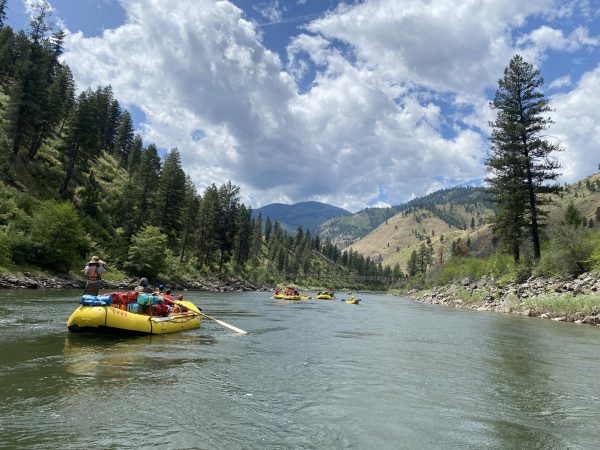 A couple weeks prior, sitting alone in the laundromat washing my sweat stained clothes, I cried. Sinking my head into my hands, feet swinging against the washing machine in my first moment alone since I’d gotten to Idaho. I was exhausted, and clearly in over my head. Wiping tears from my cheeks I scoffed “This is really what I wanted?” From the moment I saw Colorado raging through the Grand Canyon the summer before, I was certain I would chase wild rivers for as long as I could, unsure what that even meant.
A couple weeks prior, sitting alone in the laundromat washing my sweat stained clothes, I cried. Sinking my head into my hands, feet swinging against the washing machine in my first moment alone since I’d gotten to Idaho. I was exhausted, and clearly in over my head. Wiping tears from my cheeks I scoffed “This is really what I wanted?” From the moment I saw Colorado raging through the Grand Canyon the summer before, I was certain I would chase wild rivers for as long as I could, unsure what that even meant.
The river held immediate sacredness for me. It felt like a place I belonged before I even felt any sense of belonging. Now in Idaho, waking up to the call of the Canyon Wren felt like my own personal symphony. I watched in awe as Big Horn Sheep leapt from precipice to precipice, demonstrating casual agility mere feet from my boat. Each night I stared in wonder at the excruciatingly dark sky, spattered with a zillion pin pricks of light, so ubiquitous that the sky practically glowed. I thought to myself, “Am I in heaven?”
CRASSHH!
A monstrous wave gushed over the bow of our boat, flooding the deck bringing me back from my daydreams refusing to let me watch my life flash before my eyes.
“Joy, Ren, watch the eddy line on the right!” JP called.
His commands were muffled by the roar of the water, deafening our senses. Although thoughtful, nothing he said had the power to affect the outcome of our run. It was all up to us, the foamy water and our little, lost boat. With a spike in adrenaline and perhaps a little luck, we bobbed, and we sloshed, and then we were suddenly on the other side of Whiplash.
JP’s arms shot up above his head, paddle in hand! He screamed with excitement. We had done it! The three of us burst into laughter at the hilarity of the experience. We looked like amateurs… we were amateurs.
In the panhandle of Idaho where the world feels a little holier, I thought I was going to be fired. I laughed so hard I was certain I would explode. We waited below the rapid as our trip leader and the rest of the crew ran Whiplash in succession behind us. They each greased their lines, and approached us without a word. Just a signal of the hand and on we went.
Joy and I looked at each other, “That’s all? No, you’re fired?”
We rowed on towards camp, shaky from the adrenaline still coursing through our veins. The sun setting behind us, milky pink clouds threatening the close of dark approaching.
In the panhandle of Idaho where the world feels holier, I believed it truly was. We had done it. We were on the other side. We were downstream.
It occurred to me that this place that terrified me more than I knew a place could, was holier. It was holier because it was ruthless, submissive to no life over another. It was holier because every day, it felt more and more like home, until each rapid or eddy was something I respected, but didn’t cower to. It was holier because it was fed by reckless tributaries giving it life like the veins in my body. It was holier because it gave me a family of river people unlike any I’d ever known.
It was holier because I was in the panhandle of Idaho where the world truly is a little holier.
